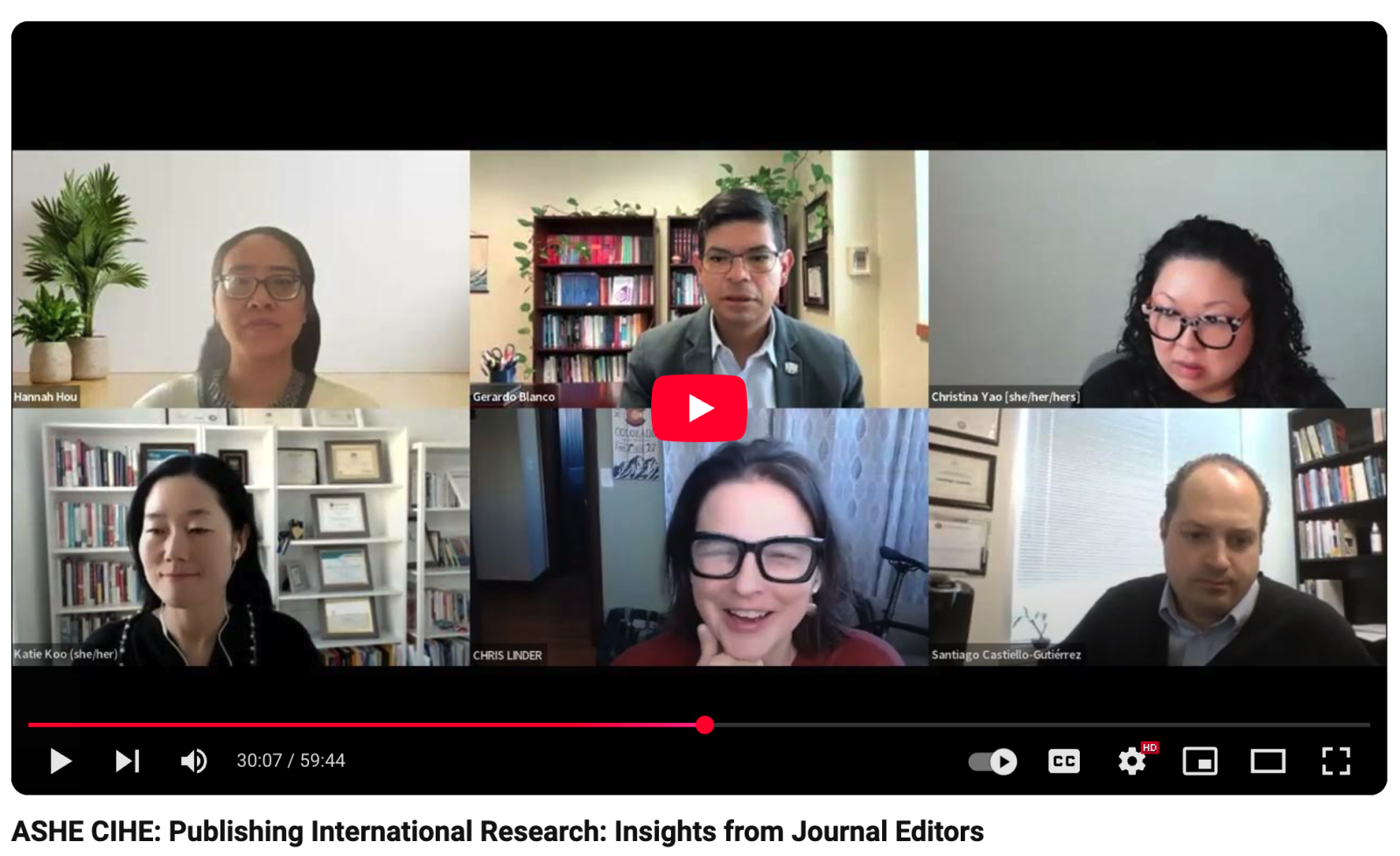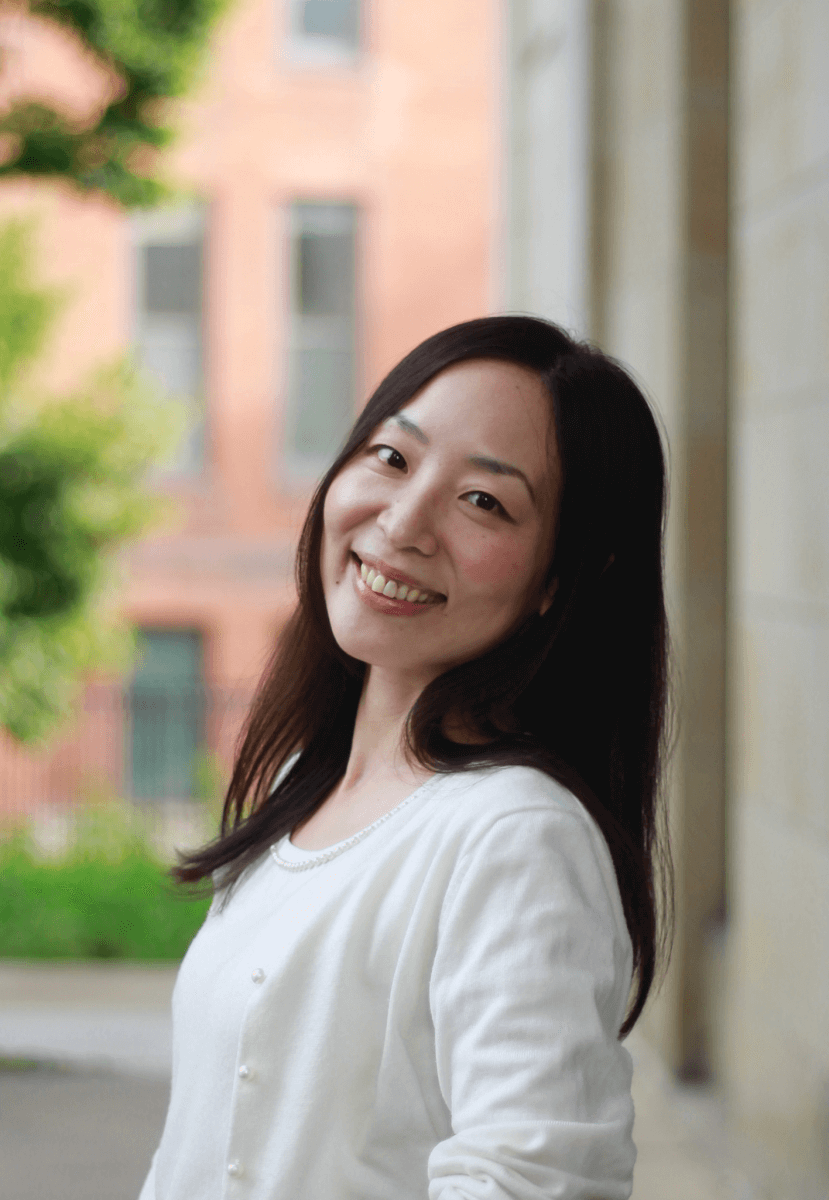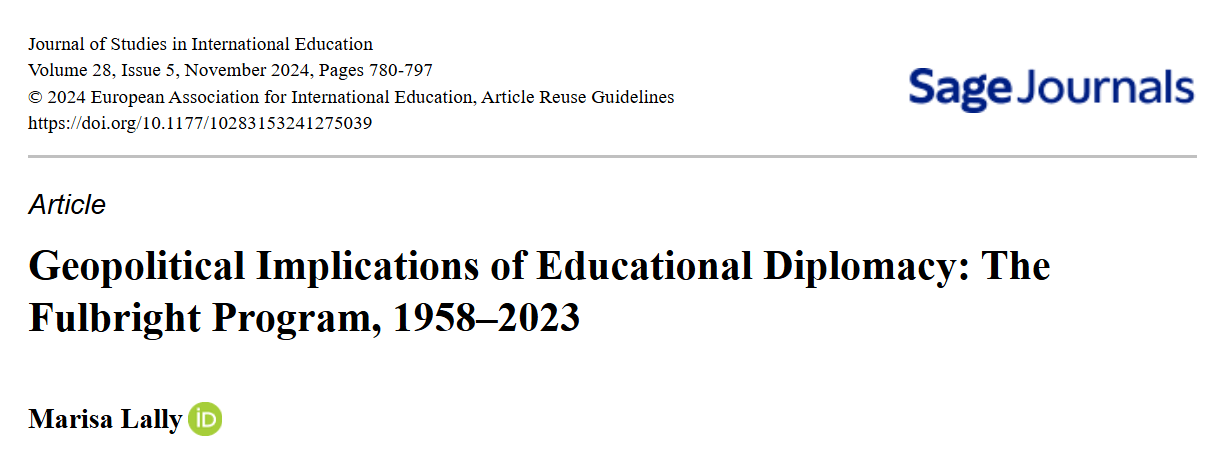CIHE April 2025 Updates
CIHE Executive Committee Update
Hello CIHE friends and colleagues!
Happy Spring! It is a busy spring season with spring break, multiple conferences, projects, etc. I hope all of you are doing well and staying healthy and enjoying the conference season. As I know spring semester is so busy, I appreciate that you take the time to read through all of the exciting updates and events that CIHE has below. CIHE events and community are possible with all your support and help, so please read carefully and sign up to participate.
Sincerely,
Katie Koo, PhD
CIHE Chair
CIHE Networking and Mentoring Program 2025
Wednesday, April 9, from 10:00 AM to 12:30 PM (Mountain Time)
The main goal of the CIHE Networking Roundtables is to facilitate new connections and potential relationships between faculty, staff, researchers, and students as a community for advancing research and theory in higher education through comparative and international perspectives. Early career scholars, researchers, and graduate students who are interested in international and comparative higher education are encouraged to attend the roundtables.
- Roundtable sessions
- Topic 1: Navigating the Tenure Track Faculty Job Market (Facilitators: Dr. Matthew A. Witenstein, Dr. Heejung Gong)
- Topic 2: Developing a Research Agenda and Preparing a Research Statement (Facilitators: Dr. Jeongeun Kim, Dr. Roy Chan)
- Topic 3: Navigating Grant Process (Facilitators: Dr. Charles F. Mathies, Dr. Christina Yao)
- Panel Discussion
- Navigating Transitions Early in Your Career (Panelists: Dr. Jenny Lee, Dr. Gerardo L. Blanco, Dr. Jia Zheng)
Call for Proposals for ASHE and CIHE Pre-Conference Now Open!
The ASHE Council for International Higher Education (CIHE) will convene its 35th Annual Forum on Wednesday, November 12th in Denver, Colorado prior to the 50th Annual ASHE conference. Proposals are due by Wednesday, April 30, 2025 at 3:00pm Mountain/Denver Time.
The CIHE Pre-Conference within the ASHE 2025 General Conference seeks proposals that resonate with the overarching theme, “The Bend in the Arc.” We invite submissions that not only delve into international higher education but also contribute to our collective understanding of scholarly identity, including scholar-practitioners perspectives and approaches. The intent is to explore the diverse facets of being a scholar on an international stage and fostering inclusivity within our scholarly community.
Following the ASHE 2025 theme, we invite scholars, activists, artists, and community leaders to engage in meaningful dialogue and innovative approaches to justice in different global contexts. This includes considering the unique challenges posed by the current volatile political and social climate. Scholars are encouraged to address, among others, the threats to freedom of speech and the suppression of diverse voices, the impact of forced migration on academic communities, and the complex dynamics that arise in international and comparative higher education settings under such circumstances.
Please note that the CIHE Pre-Conference Forum is different from the General Conference section International Higher Education. Authors can submit to either the general conference or the CIHE Pre-Conference; however, the same proposal may not be submitted to both.
Proposal Formats Accepted
- Research Paper
- Scholarly Paper
- Interactive Symposium
- Self-Designed Paper Session
- Performance, Visual, and Digital Scholarship
- Works in Progress
- Posters
Please also consider signing up as a Reviewer, Chair, and/or Discussant for the CIHE Pre-Conference. More information can be found at https://www.ashe.ws/volunteers.
If you have any questions, please contact co-chairs Charles Mathies(cmathies@odu.edu) or HyeJin Tina Yeo (yhjtina108@ucla.edu).
ASHE 50th Annual Conference
 The ASHE 2025 Call for Proposals is out! Please consider submitting your work for consideration to the International Higher Education section. The call for proposals can be found here. We also hope that you’ll consider signing up to be a proposal reviewer, session chair, and/or a discussant. Submissions are due April 30!
The ASHE 2025 Call for Proposals is out! Please consider submitting your work for consideration to the International Higher Education section. The call for proposals can be found here. We also hope that you’ll consider signing up to be a proposal reviewer, session chair, and/or a discussant. Submissions are due April 30!
Please note that while you may submit to both the International Higher Education section of the main conference, and the Council for International Higher Education pre-conference, you may not submit the same proposal in both places.
2025 Research and Discussion Webinar
We will be offering a series of webinars in 2025 that will focus on relevant and critical issues within international higher education. This will be led by our ASHE CIHE members who will share their research and facilitate discussion among the participants.
Upcoming Webinars
2024 CIHE Best Article Award Recipient, Dr. Pilar Mendoza
Tuesday, April 29, 2025 @ 9 am PST, 10 am MST, 12 pm EST
Learn more and Register
2024 CIHE Best Book Award Recipients, Drs. Shahrzad Kamyab & Rosalind Latiner Raby
"Wisdom from the CIHE Best Book Award Winners & Book Publication Strategies"
Tuesday, May 13, 2025 @ 9 am PST, 10 am MST, 12 pm EST
Facilitators: Dr. Katie Koo, Satomi Mitani, and Seyoung Hong
Learn more and Register
Recap from the CIHE February Webinar
By: Drs. Minghui Hannah Hou and Christina Yao
Publishing International Research: Insights from Journal Editors
 CIHE hosted a webinar in February that included three amazing panelists who are in editorial positions at several academic journals: Drs. Gerardo Blanco (Higher Education; Journal of Studies in International Education), Chris Linder (Journal of Diversity in Higher Education), and Katie Koo (Journal of Student Affairs Research and Practice). Panelists shared their insights on successful submissions, and some recommendations included: (1) paying attention to the aims and scope of the journal; (2) reviewing recently published articles; (3) looking from a global context; and (4) how the findings apply to the field. Audience members also had the opportunity to ask questions and overall feedback was overwhelmingly positive. A HUGE THANK YOU to Drs. Blanco, Linder, and Koo for sharing their knowledge with all of us. It is our hope that the insights from the webinar will support and encourage CIHE members to turn their ASHE papers/presentations into manuscripts to get the good work out there!
CIHE hosted a webinar in February that included three amazing panelists who are in editorial positions at several academic journals: Drs. Gerardo Blanco (Higher Education; Journal of Studies in International Education), Chris Linder (Journal of Diversity in Higher Education), and Katie Koo (Journal of Student Affairs Research and Practice). Panelists shared their insights on successful submissions, and some recommendations included: (1) paying attention to the aims and scope of the journal; (2) reviewing recently published articles; (3) looking from a global context; and (4) how the findings apply to the field. Audience members also had the opportunity to ask questions and overall feedback was overwhelmingly positive. A HUGE THANK YOU to Drs. Blanco, Linder, and Koo for sharing their knowledge with all of us. It is our hope that the insights from the webinar will support and encourage CIHE members to turn their ASHE papers/presentations into manuscripts to get the good work out there!
Other Professional Development and Academic Opportunities
Comparative and International Education Society: March 22-26, 2025 – Chicago, IL, United States
Asia-Pacific Association for International Education: March 24-28, 2025 - Delhi, India
American Educational Research Association: April 23-27, 2025 - Denver, Colorado, United States
WES-CIHE Summer Institute: June 25-26, 2025 - Boston College, Chestnut Hill, MA, United States
Open Call: Special Issues for 2025 & 2026: Journal of Comparative & International Higher Education (JCIHE)
The Journal of Comparative & International Higher Education is the official journal of the Comparative and International Education Society’s (CIES) Higher Education Special Interest Group (HESIG). JCIHE promotes scholarship opportunities, critical dialogue, and provides a link to engage professionals and academics to the international aspects of higher education. Articles in the JCIHE Special issues for 2025 and 2026 will have a double-masked-review process. Direct questions to Rosalind Raby, Editor-in-Chief (rabyrl@aol.com) https://www.ojed.org/index.php/jcihe/about/submissions.
WINTER 2026: Artificial Intelligence in Comparative & International Higher Education: Envisioning Education in a Digital Space. Guest Editors: Roy Y. Chan, Kun Dai; Tyler Watts, Weina Li Chen. The special issue examines the opportunities and challenges of intelligence (AI) and generative AI. Focus is on policy, practice, and procedures to examine impacts from a comparative and international perspective. The special issue aligns with the CIES Society 2025 conference theme on Digital Society. Submissions are DUE: JUNE 6, 2025.
Graduate Student Spotlight
 Name: Satomi Mitani (三谷聡美)
Name: Satomi Mitani (三谷聡美)
Higher Education Institution: University of Minnesota, Twin Cities
Degree: Ph.D. in Organizational Leadership, Policy and Development
E-mail: mitan005@umn.edu
Tell us about your background in higher education. I am a Ph.D. candidate in the Comparative and International Development Education (CIDE) program, at the Department of Organizational Leadership, Policy and Development (OLPD), University of Minnesota. I am an international student from Japan and obtained a master's degree in the same program. Before I came to the US, I worked as an international education professional in Japan. I have actively advocated for international students at the university, serving as President of two international student groups, for a total of four years—the Council of International Graduate Students (CIGS) for two years and as the founder and President of the College of Education and Human Development (CEHD) International Student Community (CISC) for two years. As a graduate assistant at the CEHD International Initiatives office, I am also deeply involved in international student initiatives as well as developing a study abroad program for historically underrepresented students.
What are some of your main research projects or interests? Based on my professional background, I am broadly interested in study abroad, globalization and social justice in education, and college students’ identity development and well-being. My research examines the experiences of Japanese international students in the U.S., using coloniality as a framework. It challenges conventional narratives that primarily focus on cultural adjustment and language acquisition. By centering on race and visa status, my research explores Japanese international students’ racialization experiences and how they describe and/or enact themselves within these racialized structures. My approach is particularly significant in its use of arts-based methods and collective processing of their racialized experience.
What are some potential career pathways you would like to explore after you graduate? Leveraging on my professional experience and academic learning in the fields of comparative and international education, my primary goal is to pursue a faculty position in Japan or the U.S. after my graduation. I aim to teach the issues of transnational mobility, comparative and international education, higher education, and leadership, by emphasizing the importance of developing critical consciousness, and to continue research that can foster equitable and just education. By bridging theory and practice, I strive to contribute to decolonizing scholarship and policy in international education.
How did you get involved with ASHE and/or the CIHE? I presented at ASHE for the first time in 2022 and met wonderful colleagues, which inspired me to attend again in 2023. That year, I also attended the CIHE social gathering for the first time, where I was able to share my research struggles and connect with others who related to my work. The CIHE community was warm and welcoming, and since then, I have wanted to become more involved. When I learned that the Graduate Student Liaison position would be open in 2025, I decided to apply—and I am honored to be a part of it!
What are some of your favorite aspects of being involved in ASHE and the CIHE? I love ASHE and CIHE as scholarly communities where I can meet and learn from amazing scholars, practitioners, mentors, and peers beyond my own institution. The community has provided spaces where I can share common interests, openly discuss academic issues, and learn how to navigate the U.S. academic system. It also offers opportunities to connect more deeply with others in the field of higher education and to collaborate on organizing intellectual programs. Through this community, I hope to continue expanding and deepening my network while finding inspiration for my future research.
What is something you like to do for fun, completely outside of school or professional involvements? A fun fact about me is that I am a traditional Japanese tea practitioner, and I enjoy drinking matcha. I started learning chanoyu, a traditional Japanese tea ceremony, at Urasenke stream in 2012. Urasenke is one of the three major streams descending from Sen no Rikyu, an establisher of the current form of chanoyu. I received a tea name, Sou-Sou(宗聡), which is considered a tea master, in 2019. I sometimes teach Tea ceremony at the university or perform to the public in Minnesota.
Article Spotlight
Lally, M. (2024). Geopolitical Implications of Educational Diplomacy: The Fulbright Program, 1958–2023. Journal of Studies in International Education, 28(5), 780-797. https://doi.org/10.1177/10283153241275039 (Original work published 2024)
 This article combines archival research and critical discourse analysis to examine 33 evaluation and report documents that evaluate the effectiveness of the Fulbright Program from 1958–2023. Specifically, the study employs argumentation analysis to understand the underlying ideological strategies used to discursively construct the Fulbright Program's multiple purposes. The study finds that the documents argue that education and mutual understanding are ephemeral concepts, the Fulbright Program has geopolitical justifications, and academic disciplines are a source of geopolitical power. This approach to analyzing the Fulbright Program’s historical documents provides a model for understanding educational diplomacy schemes that use higher education as a geopolitical tool.
This article combines archival research and critical discourse analysis to examine 33 evaluation and report documents that evaluate the effectiveness of the Fulbright Program from 1958–2023. Specifically, the study employs argumentation analysis to understand the underlying ideological strategies used to discursively construct the Fulbright Program's multiple purposes. The study finds that the documents argue that education and mutual understanding are ephemeral concepts, the Fulbright Program has geopolitical justifications, and academic disciplines are a source of geopolitical power. This approach to analyzing the Fulbright Program’s historical documents provides a model for understanding educational diplomacy schemes that use higher education as a geopolitical tool.
Recent CIHE Member Publications
Bodine Al-Sharif, M., Koo, K., & Bista, K. (2025). International graduate students: Unique stories and missing voices in higher education. New Directions for Teaching and Learning, 181, 13–21. https://doi.org/10.1002/tl.20616
Fei, M. (2025). Practice implications for supporting international students’ racial learning in the US. Critical Internationalization Studies Review, 4(1).
Koo, K., Bista, K., & Al-Sharif, M. A. B. (2025). “From surviving to thriving” next steps for international graduate students: A call to action. New Directions for Teaching and Learning, 181, 91–99. https://doi.org/10.1002/tl.20623
Patterson, J., Whatley, M., & Kelly, A. (2025). To All the Nations of the World: A Postcolonial Analysis of Protestant Christian-oriented Study Abroad Programs. Journal of Comparative & International Higher Education, 17(1), 105-123.
Whatley, M., Aldrich, C., & De Angelis, A. (2025). Indications of Community College Virtual International Exchange Outcomes: Global Perspective-Taking and Self-Efficacy. Journal of Studies in International Education, 29(1), 100-124.
George Mwangi, C. A. & Santana, Y. R. (Eds.). (2025). (Re) Framing College Access by and with Communities of Color: Our Knowledge, Our Process, Our Choice. State University of New York Press.
Lally, M. (2024). Geopolitical Implications of Educational Diplomacy: The Fulbright Program, 1958–2023. Journal of Studies in International Education, 28(5), 780-797.
Fei, M. (2024). Re-examining Fries-Britt’s Learning Race in a U.S. Context emergent framework drawing on the micro-level narratives of international students in the United States. Journal of Comparative & International Higher Education, 16(5), 158–169.
Hou, M. (2024). Historical Roots in Positioning Chinese International Students in the US: Race and Culture from 1872-1949. Dialogues in Social Justice: An Adult Education Journal, 9(2).
Kim, S., White, H. H., & Museus, S. D. (2024). Examining the relationship between culturally engaging campus environments and civic propensity among diverse college students. Journal of Diversity in Higher Education.
Koo, K., & Jiang, M. (2024). How can it really be effective?: Experiences of asynchronous and synchronous learning in online counseling graduate programs. Journal of Educators Online, 21(4), 1-14. https://doi.org/10.9743/JEO.2024.21.4.17
Lynch, J., Gesing, P., & Cruz, N. (2024). International student trauma during COVID-19: Relationships among mental health, visa status, and institutional support. Journal of American College Health, 72(9), 3456-3463.
Whatley, M. (2024). International Education’s Academic Benefit: Potential for Community College Virtual International Exchange. Research in Higher Education, 65(7), 1647-1678.
Mendoza, P. (2024). My liminal praxis in the American academy as a transnational scholar: A scholarly personal narrative. Journal of Diversity in Higher Education, 17(2), 110.
Bowman, N. A., Katsumoto, S., Tran, B. H., & Segre, A. M. (2024). Dining together: Social networks with international and domestic students as predictors of international students’ college success. The Journal of Higher Education, 95(6), 778-799.S
Shahjahan, R. A., Grimm, A., & Mittelmeier, J. (2024). ‘Time’ and international students. Higher Education Research & Development, 1–9. https://doi.org/10.1080/07294360.2024.2410267
Craig, I., Unkule, K., Castiello Gutiérrez, S., & Samou, J. B. (2024). Pluralizing Educational Mobilities: Towards a More Equitable and Inclusive Discourse. Comparative and International Education, 53(2).
Cruz, N. I., & Glass, C. (2024). Applying a Critical Lens. In Supporting International Students in US Higher Education: A Theory-Based Approach (pp. 53-66). Cham: Springer Nature Switzerland.
Yoon, J., & Koo, K. (2025). Enhancing Early Childhood Teacher Candidates’ Perceptions of Teaching Science-Technology-Society (STS) through a Project-based Interdisciplinary Approach, International Journal of Education in Mathematics, Science, and Technology, 13(1), 1-18. https://doi.org/10.46328/ijemst.4333.
Newsletter Submissions
The CIHE newsletter aims to inform members about the work of the CIHE community, engage members to develop community and amplify member voices and exposure. We encourage you to submit:
- new publications in international/comparative higher education;
- brief Article Spotlight;
- graduate student spotlight;
- recommendations for scholars or publications to highlight; and
- ideas, projects, conferences, publication opportunities, innovations, or opinions that the community should know about.
Newsletter content can also be submitted through e-mail Seyoung Hong at hongseyo@msu.edu.
